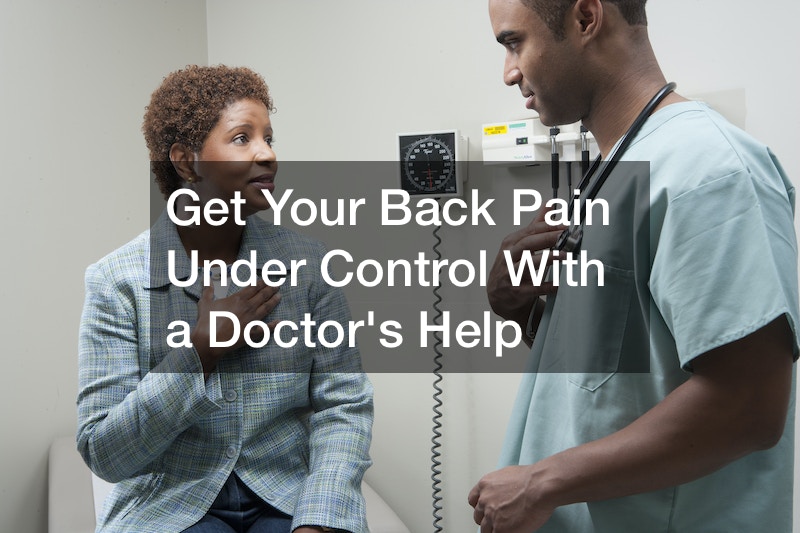
Back pain is a common medical problem affecting most adults. A lot of people end up missing work due to back pain. It can range from a dull ache to a stabbing pain. Back pain may be caused by muscle strain, accidents, disk problems, or other medical conditions such as arthritis. If you’re experiencing any of these, you may need a chiropractor.

If you suffer from back pain, your doctor may direct you to a chiropractor. Chiropractors specialize in neck and back pain. They carry out spinal manipulation to treat your back pain. They’ll also advise you on what to do to avoid a future lower back problem.
See a doctor if the pain doesn’t go away after a few days, especially if you have rested enough, or there is numbness in the legs or unexplained weight loss. The doctor will examine you and take x-rays or scans to confirm their findings. Hot compresses, ice packs, and pain relievers are used to treat back pain.
Exercise regularly, maintain a good posture and lift heavy items correctly to avoid back issues. You may check online by searching ‘my back pain is killing me’ or ‘back pain treatment online’ if your pain is unbearable and you feel the need to consult a specialist.

It’s shocking how many people around the world suffer from chronic pain, including back pain. Globally, over 1.5 billion people live with chronic pain and the National Institute of Neurological Disorders and Stroke report that 80% of adults deal with lower back pain at some point during their lives. If you suffer from low back pain, you may be on the search for low back pain relief or natural cures for back pain. We’ll be discussing treatments for back pain, such as physical therapy, medication, and even surgery. In any case, you should always speak to your doctor about lower back pain — almost 40% of Americans who have lower back pain never talk to a health professional about it. Low back pain can sometimes be symptomatic of a larger problem and will affect your quality of life, so it’s important to speak up.
What Are Some Causes of Low Back Pain?
The Annals of Rheumatic Diseases reported in a recent study that lower back pain is the world’s leading cause of disability, affecting 10% of people all across the world.
In some cases, your pain can be caused by something fairly mundane, like overwork or strenuous lifting. Rest and icing may relieve your pain and it’ll go away by itself over the course of a few days, if you’re attentive to it and don’t partake in strenuous activities that will put more pressure on it. Another common cause is degenerated or herniated discs in your back. Osteoporosis and scoliosis can also have an impact on your pain levels.
In the most serious cases, your pain could be caused by a much more problematic health issue, like diabetes, a pinched nerve, tumors, or cancer. This is why it’s important to always get your pain checked out by a health professional. Better safe than sorry, after all!
How Can I Treat My Lower Back Pain?
One of the first things you should do if you’re experiencing lower back pain is to assess how you’ve been using your back. Have you been doing heavy lifting? Are you not bending at the knees? Consider reducing the stress on your back and give it some time off if you can. Ice and heating packs can work wonders, as can anti-inflammatory pain pills.
You should also take a look at your mattress and your posture. A mattress that doesn’t support your back or bad posture can both affect your back. Consider getting a standing desk or working on back strengthening exercises to improve posture.
If you have severe chronic back pain, you may have to look into more in-depth methods of treatment. Physical therapy can be one great options, which focuses on keeping your back flexible and strong, as well as supporting your core, which can also help keep your back happy.
In the worst case scenario, you may need surgery to help with a pinched nerve, tumors, or cancer, or if there’s another extenuating circumstance under which your doctor advises you to see a surgeon. However, unless necessary, it’s often a better option to seek alternative methods to treating your pain.
Who Should I Talk to About My Lower Back Pain?
Your first stop should absolutely be with your primary care physician. He or she will hopefully have your medical history on hand and be able to see if this is a recurring problem and advise on next steps. They may want to send you on to a specialist, but having them brought into the loop from the very beginning can be a helpful first step.
You may then go on to see a physical therapist, a physiatrist, rheumatoloist, anesthesiologist, or a surgeon, depending on the severity and longevity of your pain. However, your primary care physician should be kept in the loop at all times.
The important thing is that you ARE talking to someone about your pain, instead of simply hoping that it will go away. You don’t want to aggravate the pain and it’s useful to know what caused the pain in the first place.
Find relief from your pain and improve your quality of life when you seek out professional medical care for your lower back pain.